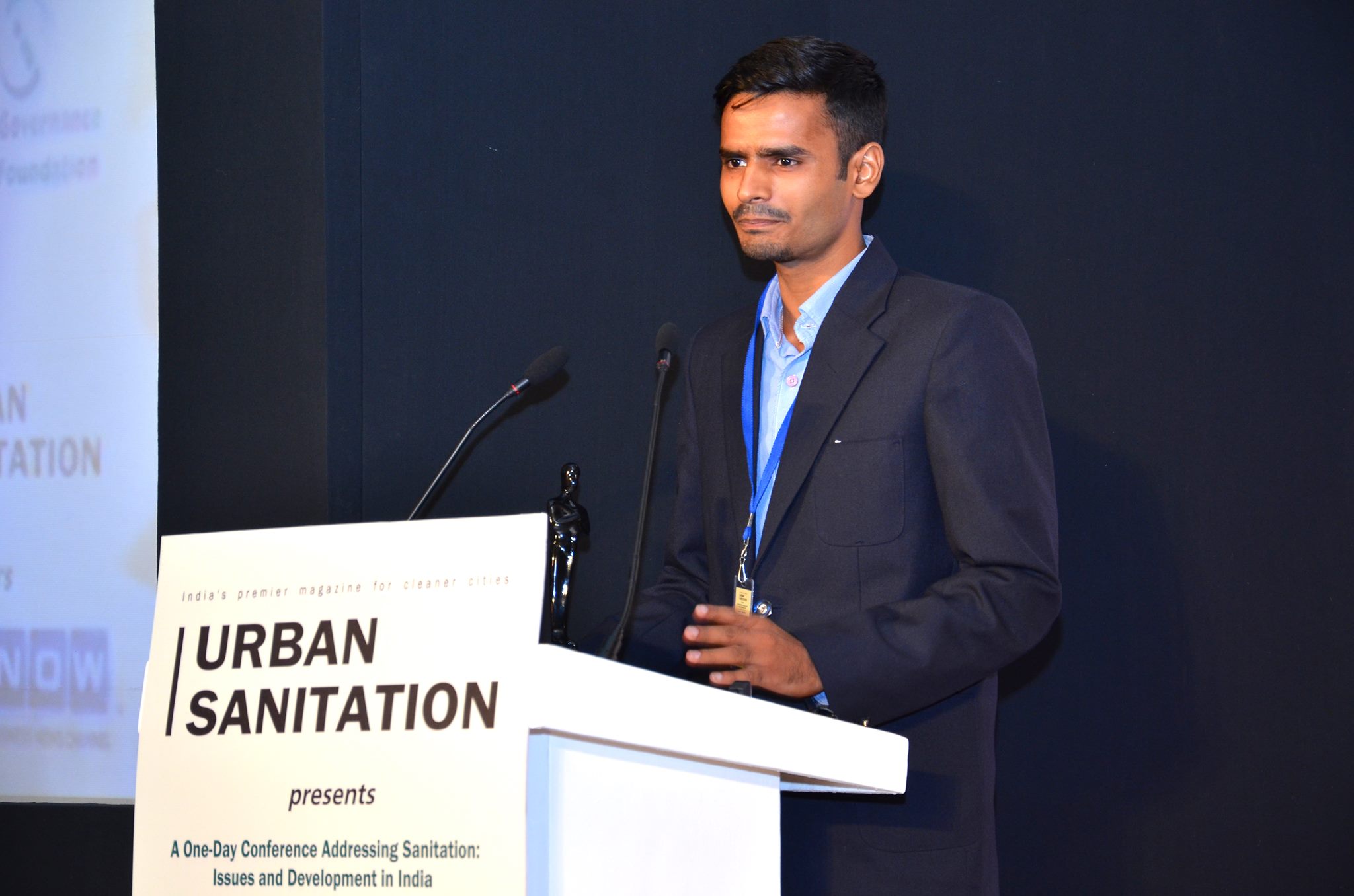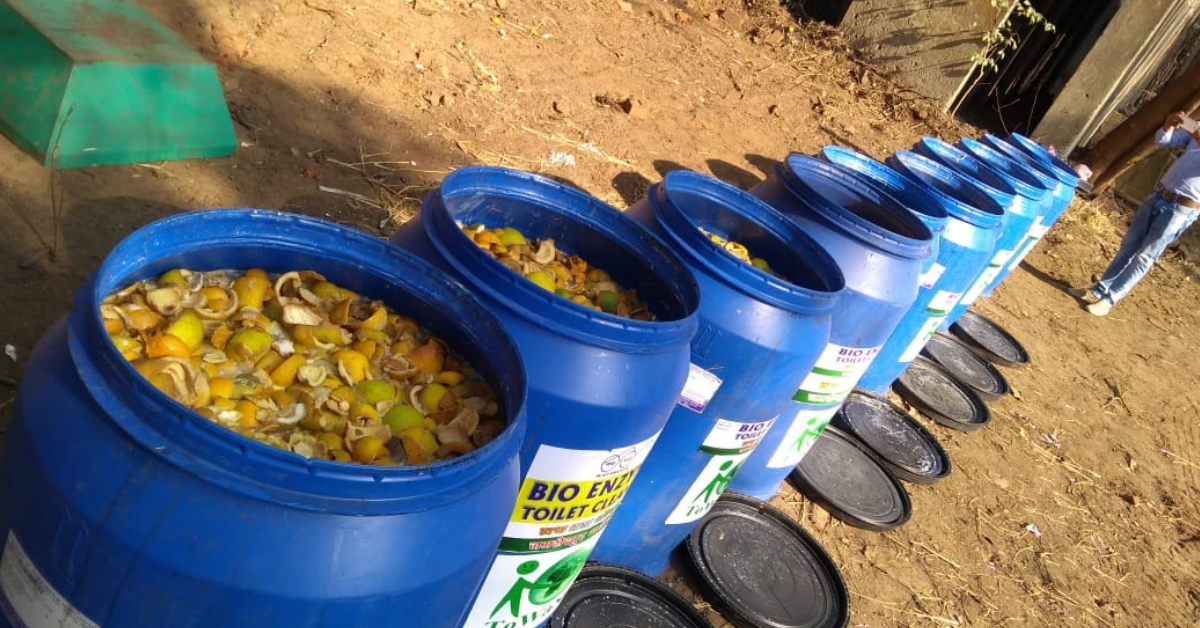When you relish an orange, what do you do with the peels?
Throw them in the dustbin, right?
But what if we told you that these peels are changing the face of community toilets in Jamshedpur?
Thanks to a low-cost innovative solution developed by alumnae from Indian Institute of Technology (IIT), Dhanbad.

Stinky toilets & fruit waste dumping grounds
A total of 58 community and public toilets in the steel city suffered the common issues of most toilets–unbearable stink. This led the city to resort to chemical cleaning agents.
Besides, the urban local body, Jamshedpur Notified Area Committee (NNAC), was concerned about the area turning into a dumping spot where several fruit juice vendors would dump food waste.
The use of strong chemicals kept the toilets and the tiles clean, but it also helped reduce the bacterial growth in the septic tank or faecal sludge treatment facility.
This was a drawback since these microbes are crucial in the process of degradation of the faecal sludge.
And so, there was the jarring need for an eco-friendly solution that would not only keep the area clean but also keep the toilets clean and shiny, while not killing the important microbes.
This pushed the JNAC to brainstorm a solution with city-based start-up ToWaSo (which stands for TOWArds SOlution).
Founded by IIT (earlier known as Indian School of Mines) alumnus, Saurabh Kumar three years ago, ToWaSo works with municipalities under the Swachh Bharat Mission, as well as companies and residential complexes to develop and execute waste management solutions.
Saurabh adds how heeding the request of the committee, his team decided to kill two birds with one stone–harness the acetic acid content of the citrus fruit waste and develop a bio-toilet cleaning solution.
100 per cent chemical-free and eco-friendly, it is made from the waste of citrus fruits like orange, lime and lemon.
How did they do it?
The idea of turning waste into resources first came to Saurabh over three years ago. This was also the incident that inspired him to establish ToWaSo.
“I was a juice centre when I saw how the shopkeeper discarded the fruit waste, and a cow ate it. What the shopkeeper considered waste was a resource and source of food for the cow. And that was the point where I decided that I wanted to establish a start-up that would not only help minimise waste but also turn it into a resource,” Saurabh tells The Better India.
With help from JNAC, ToWaSo collected fruit waste from roadside juice vendors and centres and transport it to a unit they set up near the JNAC town hall.
At this unit, they placed ten big plastic drums, nine of which were filled with 200 ml of fruit waste. The last one was filled with microbes. The nine drums were later filled with water and the required microbes.
In three to four weeks, the combined process of hydrolysis and acidogenic resulted in an acetic solution.
This solution, now christened Bio-Enzyme, is a suitable cleaning solution, that can be used to clean the toilet pan as well as the floor and walls within the toilets.
Also Read: This Toilet Has No Flush & Runs on Worms! Here’s How ‘Tiger’ Can Transform India!
What are its benefits over chemical cleaning agents?
First off, the project is helping turn fruit waste into a useful bio-enzyme toilet cleaner. So in a way, it is breathing life into waste by turning it into something useful, instead of letting it clog dumping grounds and landfills.
In the process, it reduces the dependence on chemical agents.
Additionally, says Saurabh, it is microbe-friendly, so it helps enhance the bacterial process in the septic tanks or faecal sludge treatment facilities to help degrade human waste faster.
More than anything, it works its magic without harming the environment even while being produced. Fruit waste is locally available, and the process can be income-generating for those who undertake it.
What is the financial requirement?
While the space to set up the unit has its own cost, the crucial one-time investment to facilitate the process is Rs 20,000. Over the last three months, ToWaSo has been able to convert over 600 kg of fruit waste into 5,400 litres of eco-friendly toilet cleaning solution.
While the startup is supplying the cleaning agent to JNAC for free at the moment, it soon plans to commercially market it!
And we wish them the very best!
To know more about ToWaSo, check out their Facebook page here.
(Edited by Shruti Singhal)
Like this story? Or have something to share?
Write to us: contact@thebetterindia.com
Connect with us on Facebook and Twitter.
If you found our stories insightful, informative, or even just enjoyable, we invite you to consider making a voluntary payment to support the work we do at The Better India. Your contribution helps us continue producing quality content that educates, inspires, and drives positive change.
Choose one of the payment options below for your contribution-
By paying for the stories you value, you directly contribute to sustaining our efforts focused on making a difference in the world. Together, let's ensure that impactful stories continue to be told and shared, enriching lives and communities alike.
Thank you for your support. Here are some frequently asked questions you might find helpful to know why you are contributing?

